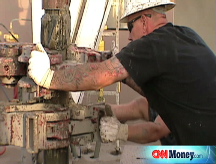Oil prices at near 22-month low
Crude and gasoline inventories rise in the latest week, according to government reports.
NEW YORK (CNNMoney.com) -- Oil prices fell to a nearly 22-month low Wednesday after a government report showed a bigger-than-expected rise in crude inventories, reinforcing concerns that demand for petroleum products is waning.
U.S. crude for December delivery fell 77 cents to $53.62 a barrel. The last time prices were this low was January 2007. Just before the report, the contract - which expires Thursday - was up 63 cents at $55.02.
The Energy Department said crude supplies rose by 1.6 million barrels in the week ended Nov. 14. Analysts had expected to see a rise of 1.2 million barrels of crude oil, according to energy research firm Platts.
An increase in crude stocks was largely expected, but the lack of any surprises backs up the idea among investors that demand for oil is on the decline, according to Stephen Schork, publisher of energy trading newsletter The Schork Report.
"We are in a well-defined bearish market, and this report is bearish by default," said Schork.
The government also reported that supplies of gasoline had risen by 500,000 barrels, and stockpiles of distillates, which are used to make diesel fuel and home heating oil, fell by 1.5 million barrels.
Analysts had expected to see a 700,000 barrel rise in gas supplies, and a 900,000 barrel rise in distillates.
Meanwhile, the rate at which refineries were operating last week rose 0.3 percentage point to 84.9%, the opposite of the 0.3 percentage point decline that had been expected by analysts polled by Platts.
Falling demand: Concern about demand for petroleum products has driven crude oil prices down from a record high of $147.27 a barrel in mid-July. The decline has also slashed the price of unleaded gasoline in half since July to $2.047 a gallon, motorist group AAA reported Wednesday.
"People [are] cautious about crude after the monster pull-back [since July]," said Tom Orr, head of research with brokerage Weeden & Co. in Connecticut.
Crude prices have been on the decline as investors worry about recession in developed nations such as the United States, the world's largest oil consumer, and in the developing world, where fuel demand had been rising the fastest.
Falling fuel prices have led to the largest percent decline in consumer prices since 1947, adding to worries about falling demand for all goods and services.
A read on new home construction also hit its lowest level since 1959, and the struggling U.S. automobile industry continues to clamor for a government bailout that will keep them and the thousands they employ above water.
The long term outlook for oil consumption does not look good, according to Schork.
"The economy's in the toilet, demand is in the toilet," said Schork, "Oil could jump $10 a barrel tomorrow, it really doesn't change my view that this is a [declining] market." ![]()




